
Choosing your accounting software is one of the most critical foundational decisions for any UK startup. The right platform doesn't just track numbers; it provides the financial clarity needed to navigate growth, secure funding, and ensure HMRC compliance from day one. Gone are the days of clunky spreadsheets and shoeboxes of receipts. Today's cloud solutions offer real-time insights, automate tedious tasks like invoice chasing, and integrate seamlessly with the tools you already use.
This guide moves beyond marketing hype to deliver an honest, in-depth analysis of the best cloud accounting software for startups in the UK. We provide a comprehensive breakdown of the top 12 platforms, including direct comparisons of major players like Xero, QuickBooks, and FreeAgent, focusing on their unique strengths and integration ecosystems. You'll find detailed reviews tailored to specific business models, whether you're a sole trader, a growing limited company, or an eCommerce entrepreneur.
Inside, we explore:
Each review is organised for quick scanning and includes screenshots and direct links, helping you make an informed decision without wading through generic feature lists. Our goal is to equip you with the insights needed to select a powerful, scalable financial hub that supports your business's long-term success.
Before diving into the full list, it's essential to compare the three market leaders: Xero, QuickBooks, and FreeAgent. Each targets a slightly different startup profile, and understanding their core philosophies is key to making the right choice.
A key differentiator is how these platforms connect to other business software. A robust integration ecosystem automates workflows and creates a single source of financial truth.
Xero: The undisputed champion of integrations, with over 1,000 apps in its marketplace. This is its biggest advantage. For startups, key integrations include Stripe (payments), Shopify (eCommerce), Hubdoc (receipt capture, included with Xero), Pipedrive (CRM), and GoCardless (direct debit). This vast selection allows startups to build a highly customised and automated tech stack.
QuickBooks Online: Boasts a large app store with over 750 integrations. While smaller than Xero's, it covers all the critical areas for small businesses. Standout integrations include deep connections with PayPal, Stripe, Square (point of sale), and its own QuickBooks Time and QuickBooks Payroll for a seamless in-house experience. It’s excellent for retail and eCommerce startups.
FreeAgent: Takes a curated approach, focusing on quality over quantity. It offers essential integrations crucial for its target audience of freelancers and small businesses. Key connections include Stripe, PayPal, GoCardless, and Shopify. Its most valuable "integration" is with UK banking, offering the full software for free to NatWest, RBS, and Mettle customers, a unique and powerful value proposition.
In summary, choose Xero for ultimate flexibility and scalability, QuickBooks for powerful, all-in-one features, and FreeAgent for unparalleled simplicity and UK tax compliance, especially if you bank with one of its partners.
Xero stands out as one of the best cloud accounting software for startups, particularly those anticipating growth. Its key differentiator is offering unlimited user access across all plans, a feature often restricted by competitors like QuickBooks. This is invaluable for expanding teams, allowing founders, bookkeepers, and accountants to collaborate seamlessly without incurring extra costs per user. The platform is celebrated for its clean, intuitive user interface, which simplifies complex accounting tasks.
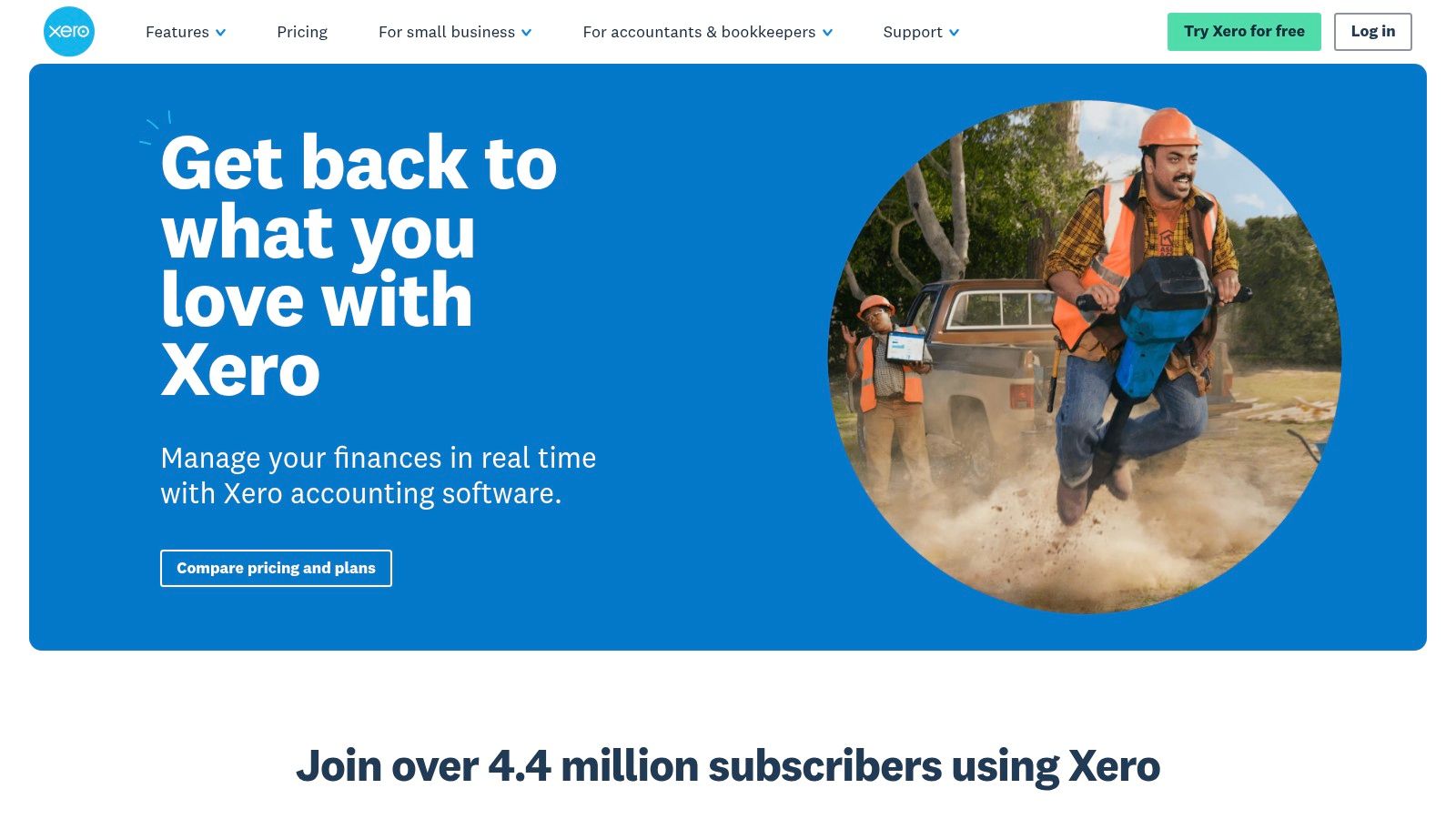
Compared to FreeAgent, which focuses on simplicity for freelancers, Xero provides a more robust and scalable framework. It boasts one of the most extensive app marketplaces, with over 1,000 third-party integrations. This allows startups to build a customised tech stack, connecting tools like Stripe for payments, Hubdoc for document capture, and Shopify for e-commerce, creating a powerful, interconnected financial ecosystem.
Pros:
Cons:
Xero is an excellent choice for ambitious startups that value collaboration and require a flexible platform that can grow with them. Properly setting up your chart of accounts and integrating key apps from day one is crucial for maximising its value and maintaining organised finances, which is fundamental to a startup's success. For more insights on financial management, you can explore detailed tax advice for small businesses to complement your accounting software setup.
QuickBooks Online is a dominant force in the cloud accounting software market, offering a comprehensive and scalable solution ideal for startups poised for growth. Its key strength lies in its all-in-one functionality, combining robust accounting features with an intuitive dashboard that provides a clear financial overview. This makes it an excellent choice for founders who need detailed reporting, VAT management, and expense tracking from a single platform.
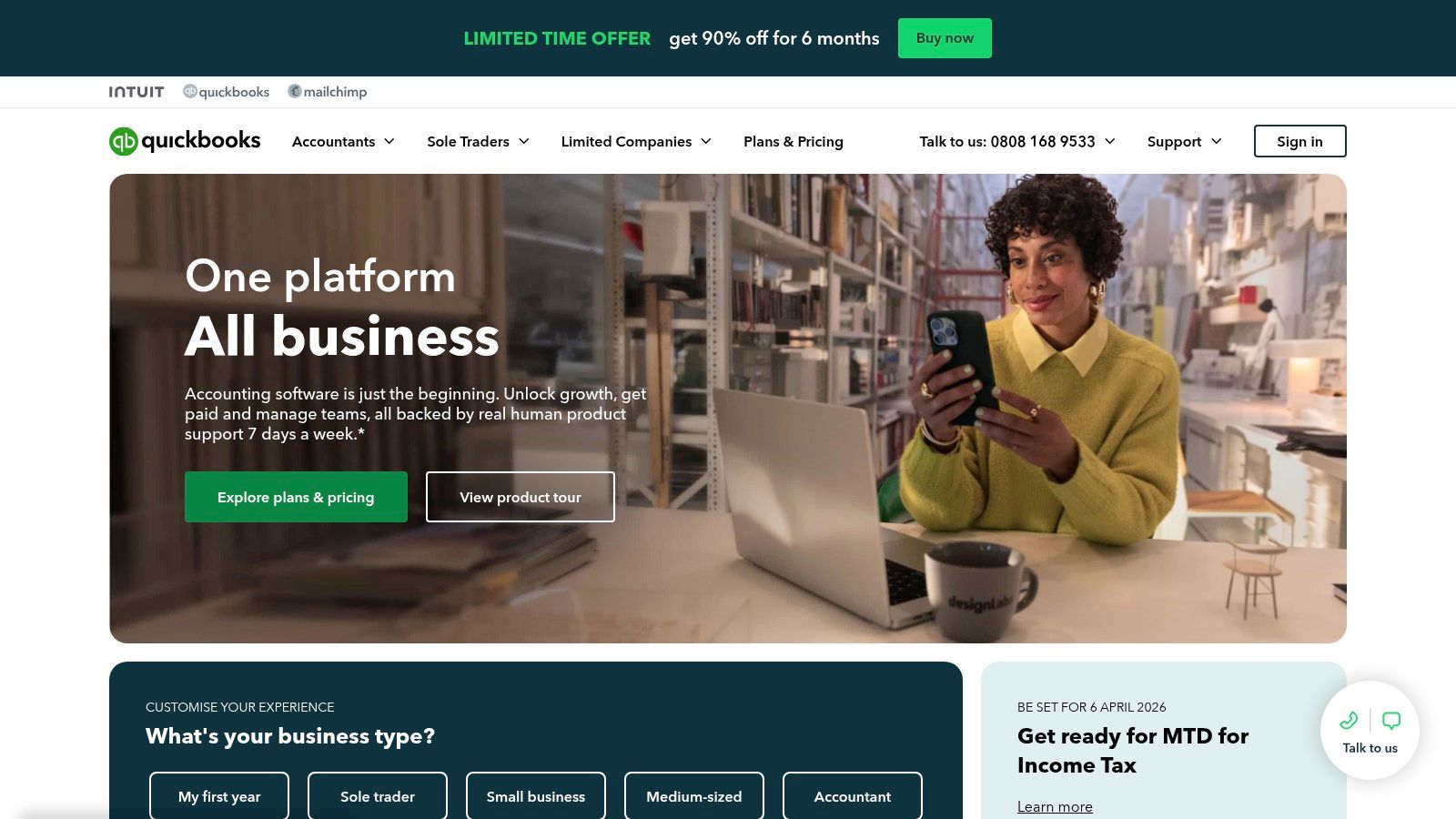
Unlike Xero's unlimited user model, QuickBooks restricts user numbers on its lower-tier plans, making it more suited for startups with a smaller core finance team. However, it excels with features like built-in mileage tracking via its mobile app and sophisticated inventory management in higher tiers. Its app ecosystem, while smaller than Xero’s, features deep integrations with key tools like PayPal, Stripe, and major e-commerce platforms, ensuring a connected workflow for most business models.
Pros:
Cons:
QuickBooks Online is one of the best cloud accounting software for startups that require a powerful, feature-rich solution from the outset. To maximise its potential, ensure you connect it directly to your business finances. This is a vital step and you can find guidance on how to set up a business bank account to streamline your financial operations.
Sage Business Cloud Accounting positions itself as a strong contender for the best cloud accounting software for startups, especially for those with a UK focus. Its primary strength lies in its deep-rooted reputation and robust compliance tools, making it an excellent choice for businesses that prioritise adherence to HMRC regulations from day one. The platform leverages AI-powered automation for tasks like bank reconciliation and offers features like cash flow forecasting, which are invaluable for strategic planning.
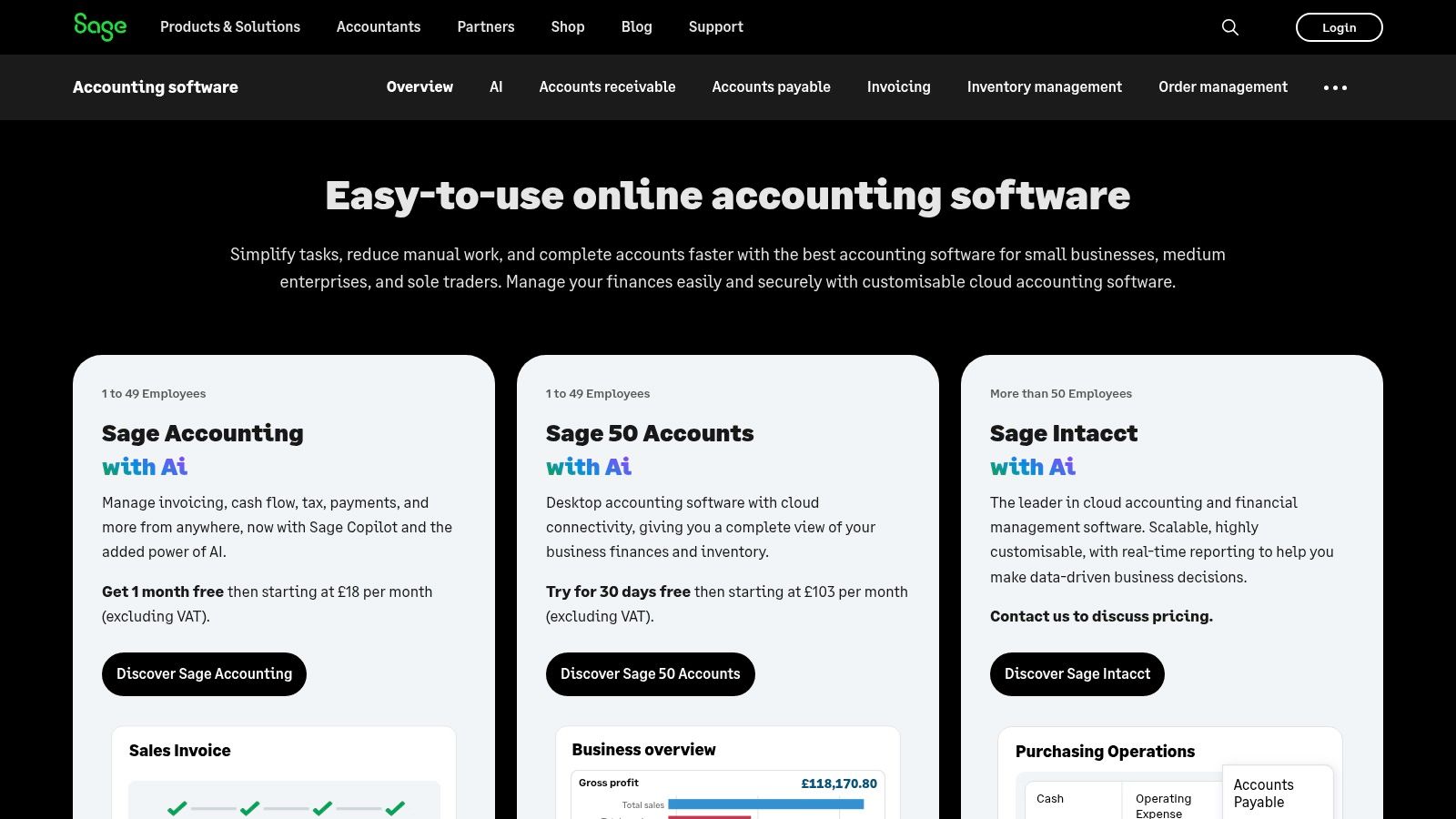
While Xero boasts a larger app marketplace, Sage focuses on core accounting strength and tight integration with tools like Microsoft 365. Unlike FreeAgent, which is streamlined for freelancers, Sage provides a more structured and scalable path. This makes it suitable for startups that anticipate evolving from a simple operation into a more complex small or medium-sized enterprise requiring sophisticated financial reporting and management.
Pros:
Cons:
Sage is ideal for startups that need a reliable, compliant, and scalable accounting foundation. To truly leverage its forecasting tools, understanding your financial performance is key. Exploring how management accounts can drive business performance can provide the insights needed to make the most of Sage's capabilities.
FreeAgent distinguishes itself as an ideal cloud accounting software for UK-based startups, particularly freelancers, contractors, and micro-businesses. Its core strength lies in its simplicity and an all-in-one approach to finance management, with a keen focus on UK tax compliance. Unlike the broader, more complex platforms like Xero or QuickBooks, FreeAgent is designed to guide users with minimal accounting knowledge through their financial obligations, making it exceptionally user-friendly.
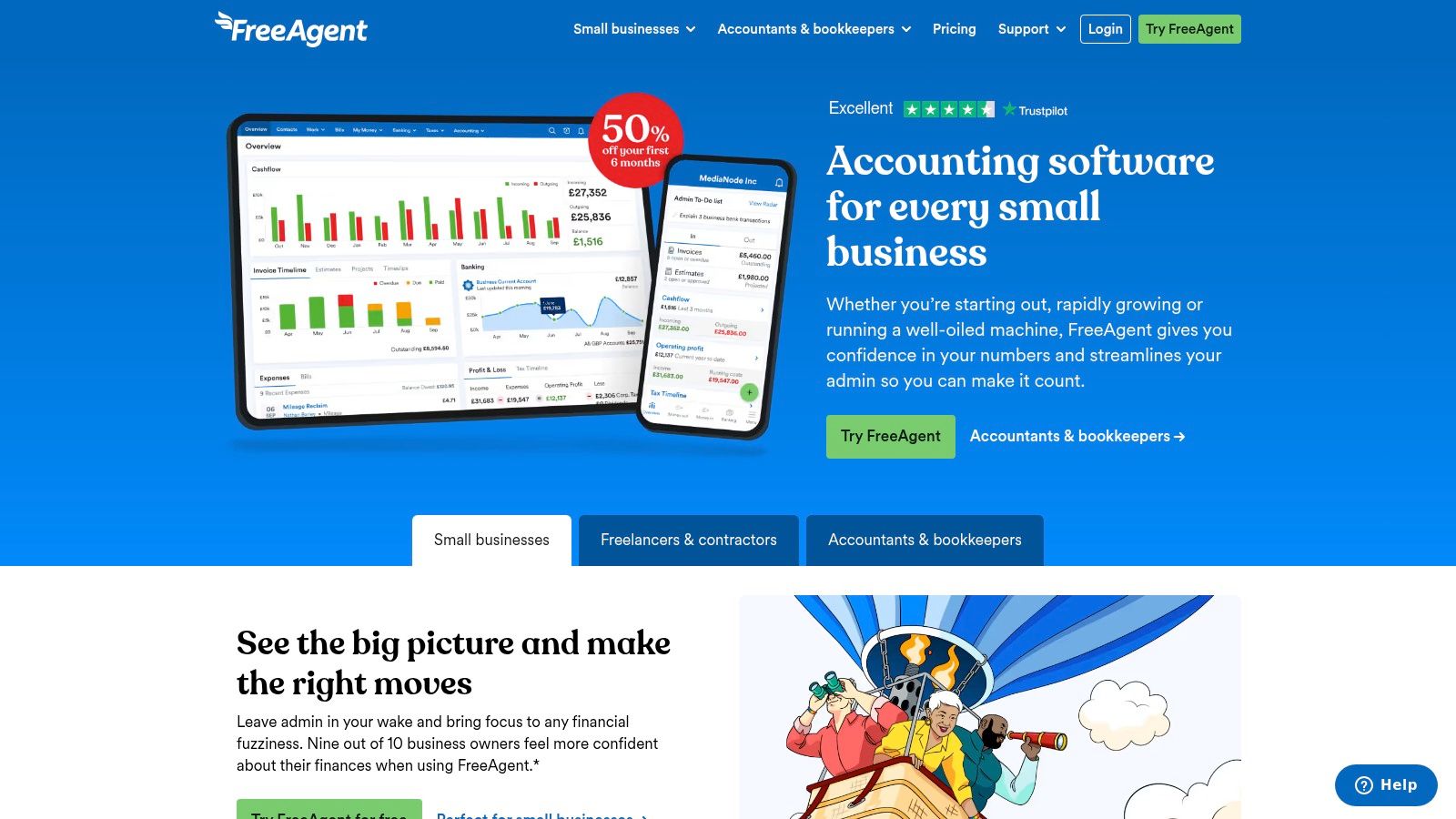
The platform is renowned for its direct HMRC integration, simplifying submissions for VAT, Self Assessment, and Corporation Tax directly from the software. A key differentiator is its unique banking partnerships; customers with business accounts at NatWest, Royal Bank of Scotland, or Mettle can get FreeAgent completely free of charge. While its integration marketplace is more curated than Xero's, it covers essential connections like Stripe, PayPal, and Shopify, suiting the needs of most small-scale operations without overwhelming them.
FreeAgent offers a single, comprehensive plan, simplifying the choice for startups. Pricing is often discounted for the first few months.
Pros:
Cons:
FreeAgent is the perfect choice for sole traders and small limited companies who prioritise ease of use and seamless UK tax compliance over extensive customisation. It's a powerful tool for managing day-to-day finances without the steep learning curve of more complex systems.
Zoho Books is a powerful contender for the best cloud accounting software for startups, especially for those already invested in or planning to use the extensive Zoho ecosystem. Its main advantage is its seamless integration with over 50 other Zoho apps, including CRM, Projects, and Inventory. This creates a deeply connected business management suite where financial data flows effortlessly between different operational areas, offering a unified experience that standalone accounting platforms cannot match.
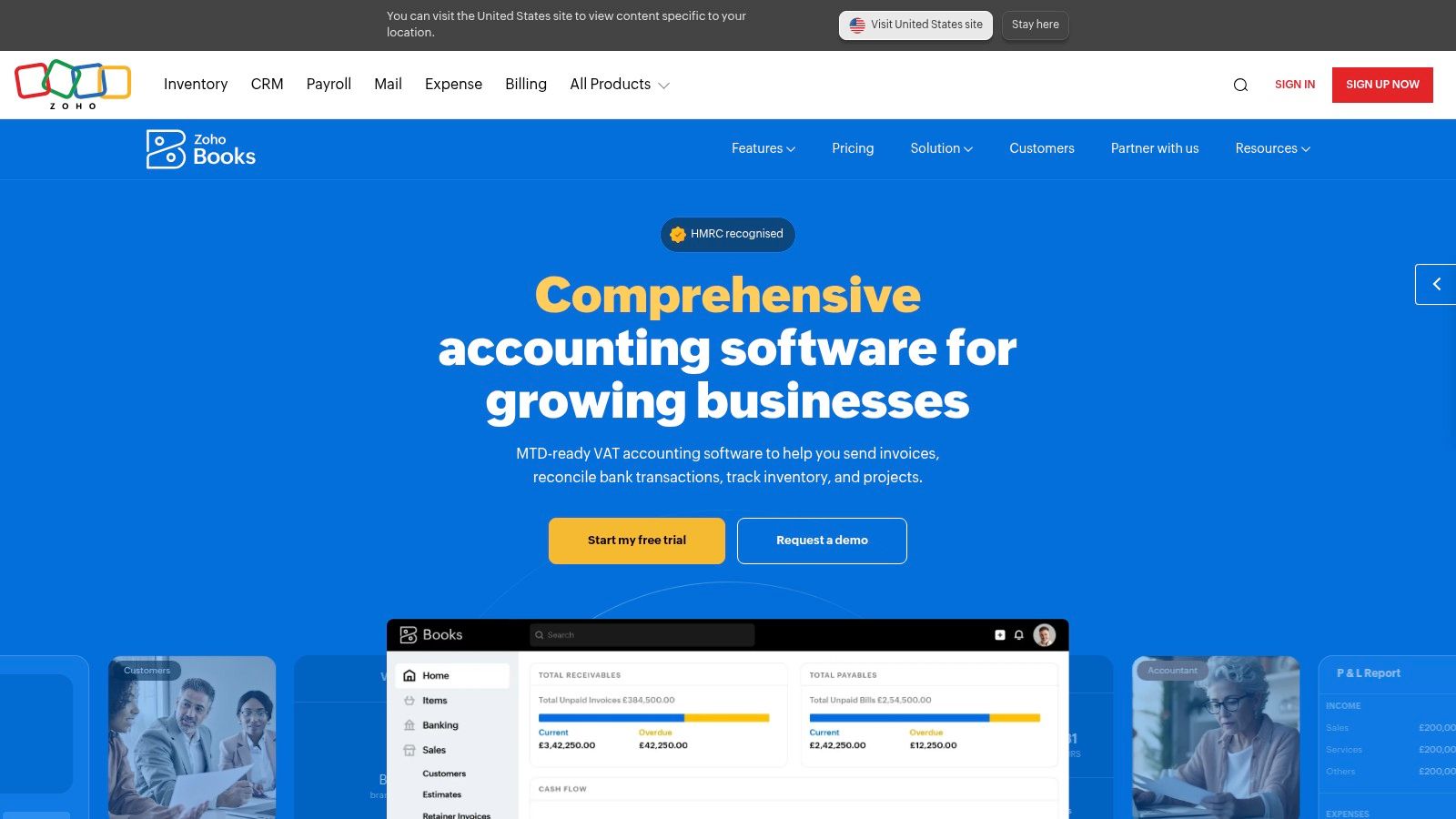
While Xero and QuickBooks lead with vast third-party app marketplaces, Zoho's strength lies in its native, in-house connections. This tight integration simplifies workflows, such as converting a quote from Zoho CRM into an invoice in Zoho Books with a single click. The platform also offers powerful automation features, allowing startups to set up rules for categorising transactions, sending payment reminders, and generating recurring invoices, freeing up valuable founder time.
Pros:
Cons:
Zoho Books is ideal for startups that prioritise affordability and an all-in-one software ecosystem over extensive third-party integrations. It provides a robust foundation for managing your finances from day one. To understand the broader steps involved in launching your company, you can review this guide on how to start a business in the UK.
KashFlow is a strong contender for the best cloud accounting software for startups, particularly those operating exclusively within the UK. Its core strength lies in its simplicity and direct focus on UK-specific compliance. The platform is designed from the ground up for small British businesses, making tasks like submitting VAT returns through Making Tax Digital (MTD) incredibly straightforward. This laser focus on the UK market sets it apart from more global platforms like QuickBooks or Xero, offering a less cluttered experience for startups that don't require multi-currency or international features.
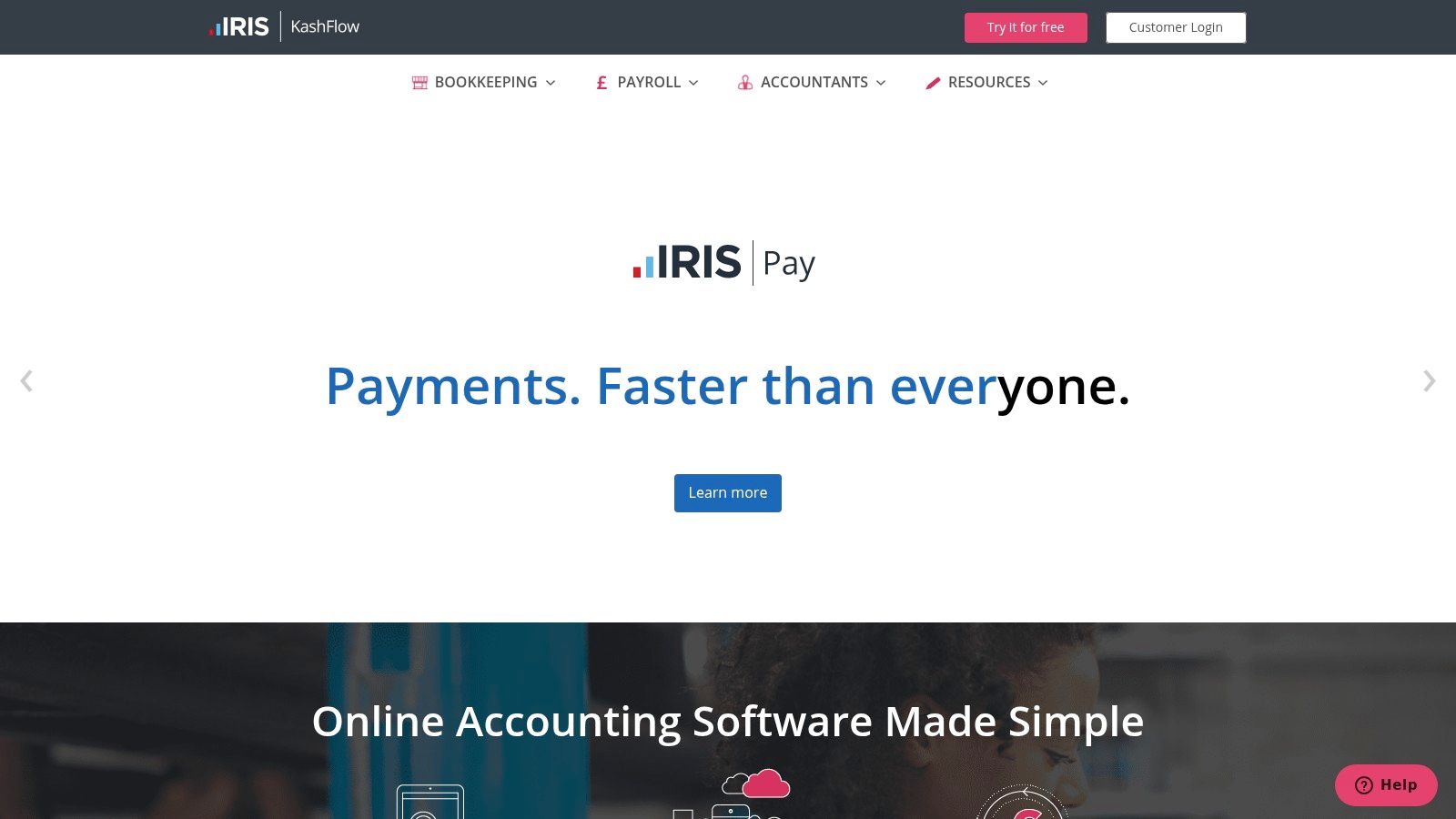
Compared to FreeAgent, which also excels in simplicity for freelancers, KashFlow's integrated payroll (available as an add-on) provides a more cohesive solution for small but growing teams. While its third-party integrations aren't as extensive as Xero's marketplace, it covers the essentials for many UK businesses, connecting with payment gateways and offering a solid, user-friendly interface that simplifies bookkeeping without overwhelming new founders. Its pricing structure is also refreshingly simple and competitive.
Pros:
Cons:
KashFlow is an excellent starting point for UK-based sole traders and small limited companies that need a no-fuss, compliant accounting tool. Its value lies in its simplicity and affordability, making it a pragmatic choice for founders prioritising ease of use and local tax compliance over extensive scalability or international features. For more information, visit the KashFlow website.
FreshBooks has carved out a niche as one of the best cloud accounting software for startups that prioritise client service and billing. Its defining strength lies in its invoicing and time-tracking capabilities, which are arguably the most intuitive and user-friendly in the market. This is perfect for service-based startups, consultants, and freelancers who need to create professional proposals, track billable hours accurately, and automate payment reminders without a steep learning curve.
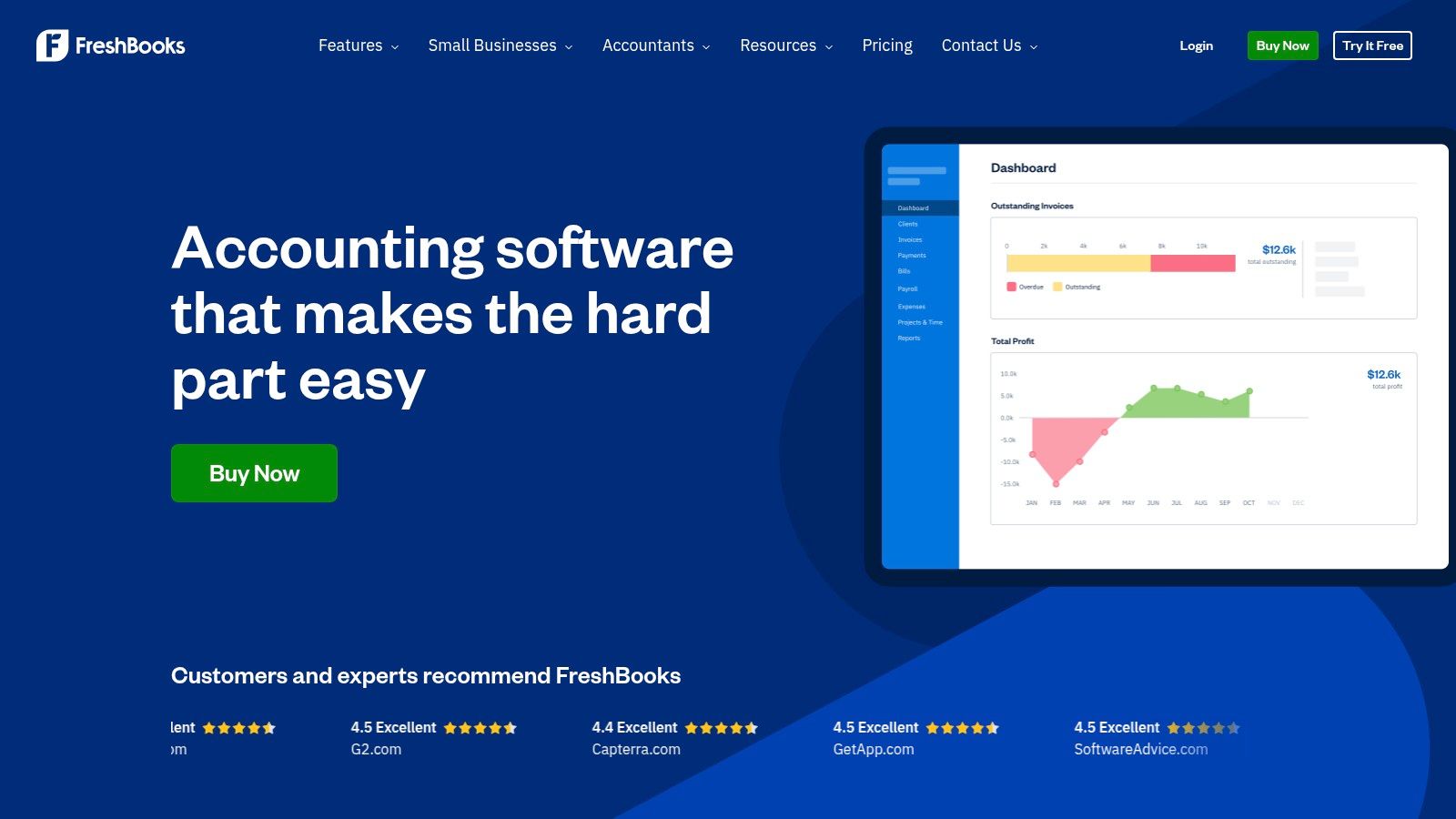
While platforms like Xero and QuickBooks aim for an all-encompassing accounting solution, FreshBooks focuses on the core revenue-generating activities for small businesses. It offers a simpler, more guided experience for tasks like expense tracking and project management. Its award-winning customer support is another key differentiator, providing accessible help for founders who may not have an accounting background, ensuring they can manage their finances with confidence.
Pros:
Cons:
FreshBooks is an excellent starting point for startups focused on professional services. Its strength in invoicing and client management helps ensure healthy cash flow from day one. To get the most out of it, integrating it with a solid bookkeeping service can help bridge any gaps as your business needs become more complex, ensuring your financial records remain organised and compliant.
Clear Books is a strong contender for UK-based startups, particularly those in construction or those who value a clean, straightforward approach to accounting. Its key differentiator is its dedicated focus on the UK market, with built-in features for VAT returns and Construction Industry Scheme (CIS) management that are seamlessly integrated. This makes it an excellent choice over more globally focused platforms if your operations are primarily within the UK, simplifying compliance without needing complex workarounds.
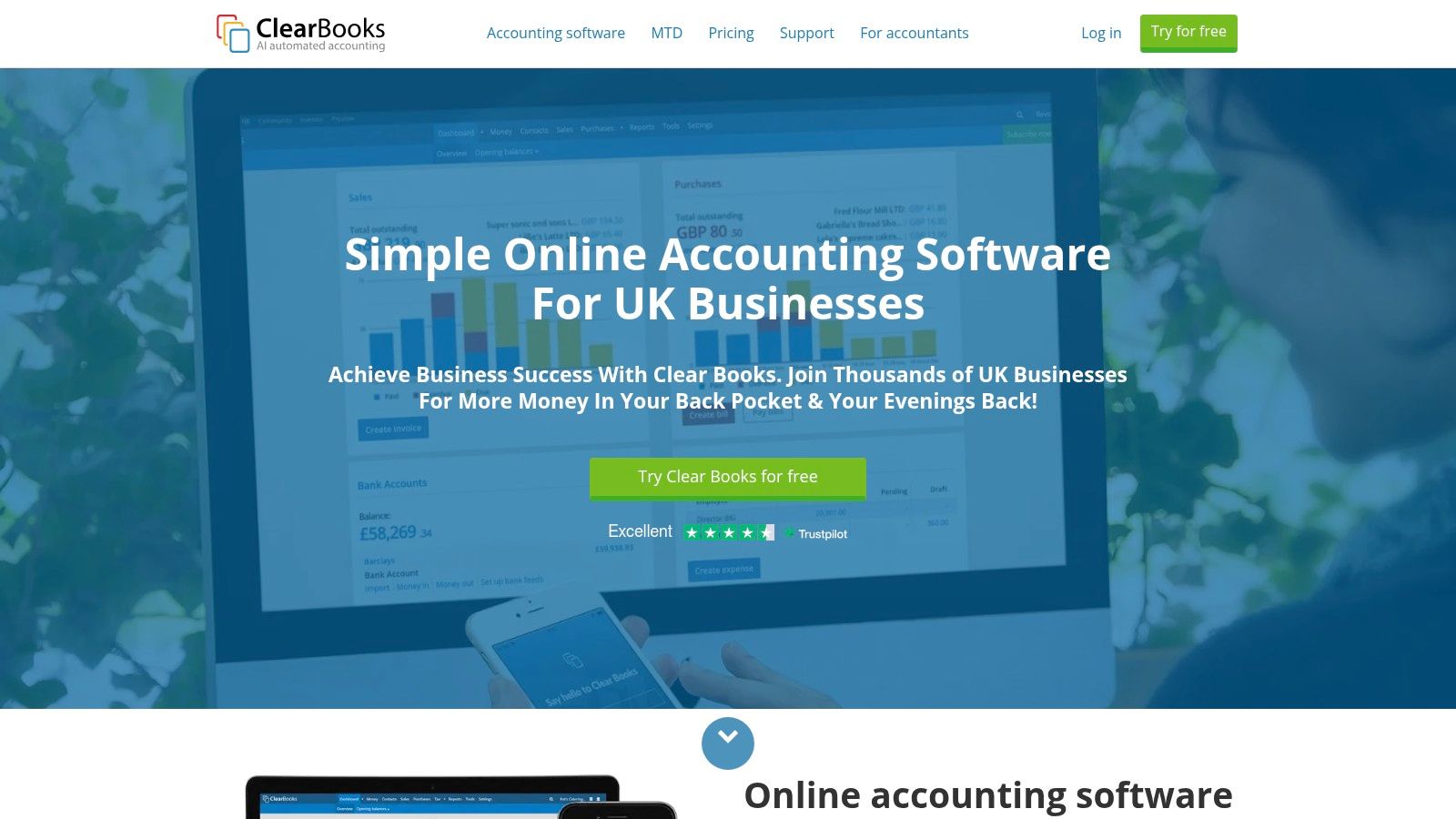
Unlike Xero or QuickBooks, which boast vast app marketplaces, Clear Books offers a more curated selection of integrations, focusing on core UK business needs like banking and payments. Its standout feature is its AI-powered bookkeeping, which automates data entry and categorisation, saving valuable time for founders. While FreeAgent also excels at simplicity, Clear Books provides more granular project management tools, allowing startups to track profitability on a per-project basis directly within their accounting software.
Pros:
Cons:
Clear Books is an ideal choice for UK startups that need robust, localised compliance tools without the complexity of a global platform. It is one of the best cloud accounting software for startups in the construction sector or any business that prioritises ease of use and affordability over extensive third-party integrations. For more information, visit the Clear Books website.
Reckon One carves out a unique niche in the cloud accounting software market with its highly modular, "build-your-own" approach. Its key differentiator is the pay-as-you-go pricing model, which allows startups to select and pay only for the specific features they need. This makes it an exceptionally cost-effective option for early-stage businesses operating on a lean budget, as they avoid paying for bundled features they may not use. This customisable structure offers a level of flexibility not typically seen in more rigid, tiered plans from competitors.
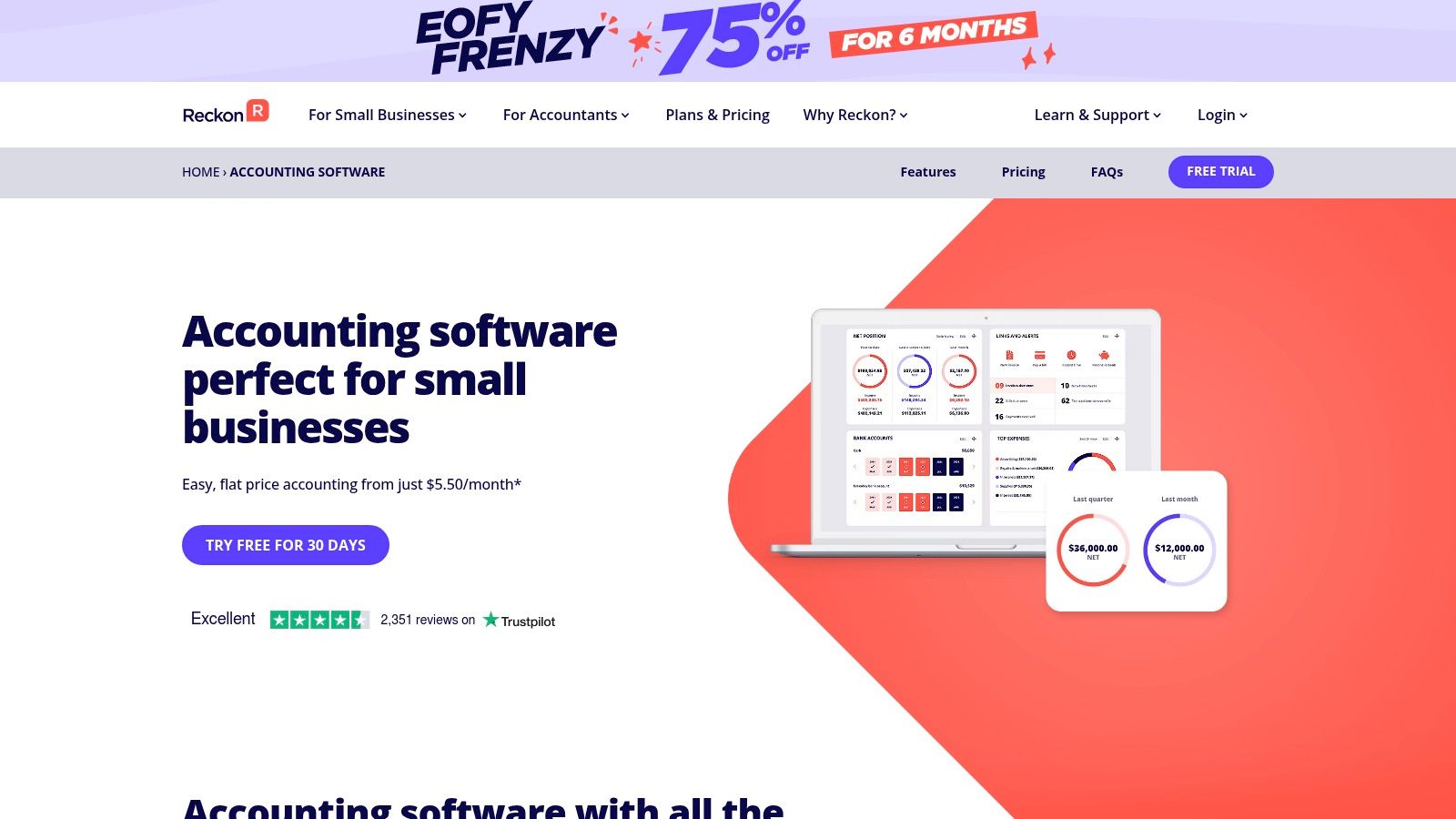
Unlike platforms like Xero or QuickBooks that offer all-inclusive (but more expensive) tiers, Reckon One enables founders to start with a basic core package and add modules like invoicing, bank data, or payroll as the business grows. This granular control is ideal for startups wanting to manage cash flow meticulously from day one. The inclusion of a capable mobile app ensures that essential tasks like expense tracking and invoicing can be handled on the go, keeping finances organised and up-to-date.
Reckon One's pricing is modular. The base plan starts at £8/month, with modules available as add-ons.
Pros:
Cons:
Reckon One is a strong contender for sole traders and micro-startups that need a simple, no-frills accounting solution with maximum control over costs. To use it effectively, carefully assess which modules you truly need at launch to avoid feature gaps while capitalising on its affordability.
Wave Accounting secures its place as one of the best cloud accounting software for startups by offering its core services completely free of charge. This is a massive advantage for early-stage businesses, freelancers, and sole traders operating on a lean budget. Unlike competitors that gatekeep features behind paid tiers, Wave provides unlimited invoicing, expense tracking, and reporting without a monthly subscription fee. This makes it an incredibly accessible entry point into professional financial management.
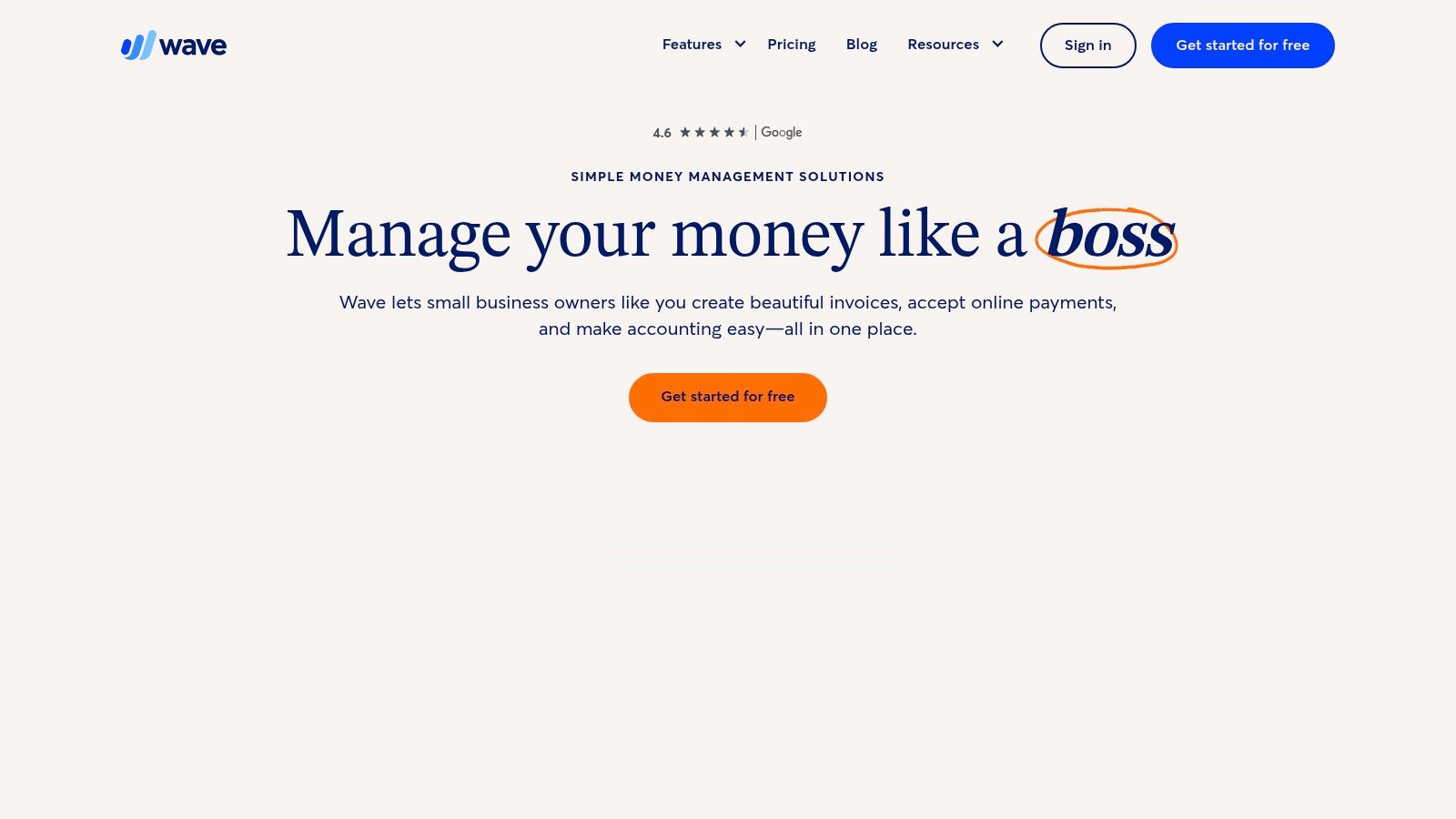
While platforms like Xero and QuickBooks are built for scalability with extensive integrations, Wave focuses on delivering fundamental accounting tools with exceptional simplicity. The user interface is clean and straightforward, minimising the learning curve for founders who may not have a background in finance. It’s an ideal solution for service-based businesses that need robust invoicing and payment processing without the complexity or cost associated with more comprehensive enterprise systems.
Pros:
Cons:
Wave is a fantastic starting point for UK startups and freelancers who are not yet VAT-registered. Its free model allows for professional financial organisation from day one. However, businesses anticipating rapid growth or those requiring MTD compliance should view it as a stepping stone before migrating to a more scalable, UK-focused platform like FreeAgent or Xero.
Kashoo is an excellent choice for early-stage startups and sole traders seeking a straightforward, no-frills accounting solution. Its main appeal lies in its simplicity and affordability, making it one of the best cloud accounting software for startups that don't yet require complex features. The platform is designed to handle core tasks like invoicing, expense tracking, and bank reconciliation efficiently, without the steep learning curve associated with more comprehensive systems like QuickBooks or Xero. This focus on essentials is ideal for founders who need to manage their own books with minimal fuss.
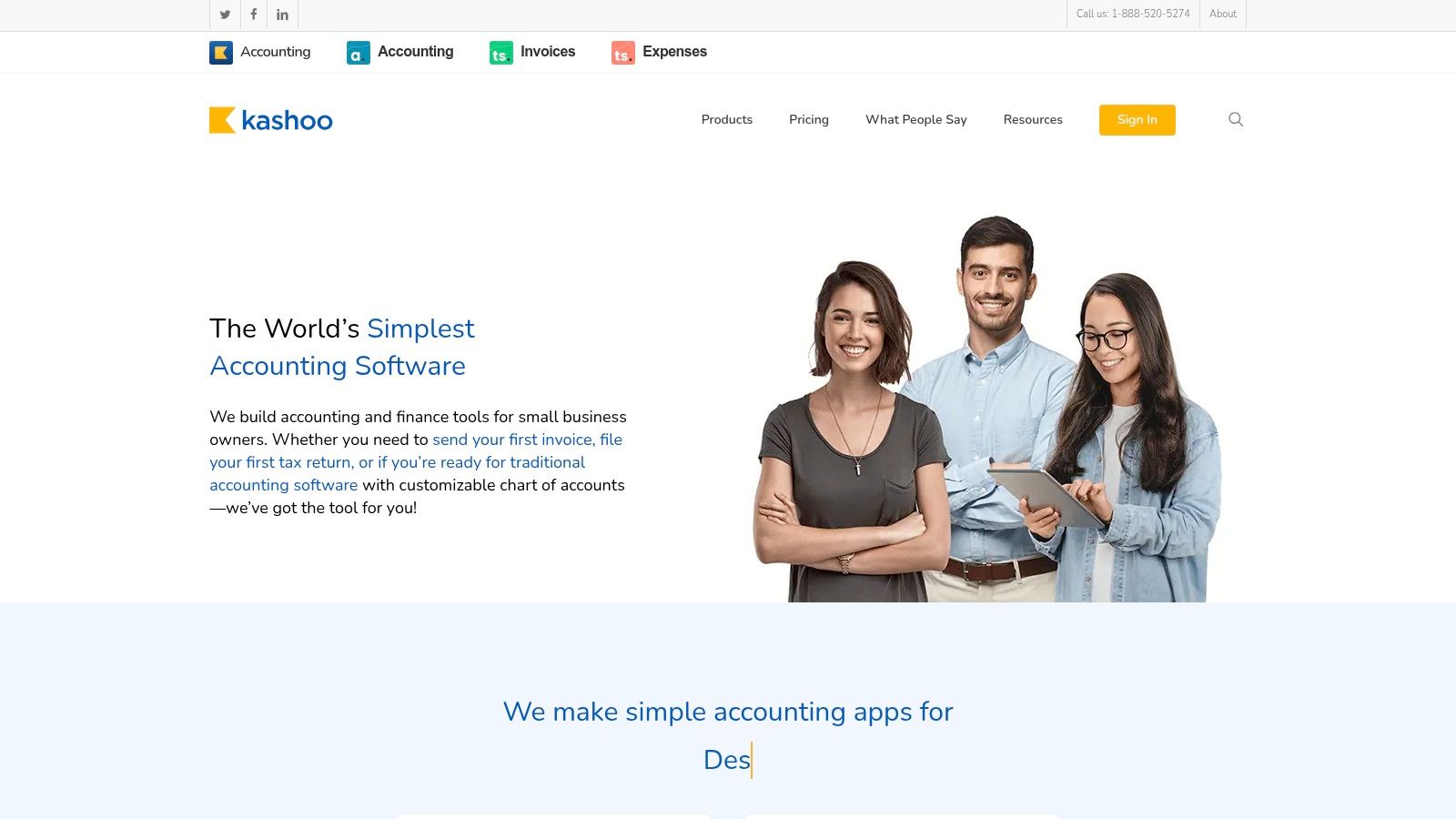
Unlike competitors that offer tiered plans, Kashoo provides a single, all-inclusive subscription that simplifies the decision-making process for new businesses. While it lacks the vast integration marketplace of Xero or the advanced payroll capabilities of QuickBooks, its streamlined approach ensures that fundamental accounting needs are met effectively. This makes it a great starting point for businesses before they scale to a size that demands more sophisticated financial management tools and integrations.
Kashoo offers a straightforward pricing model, focusing on core functionalities without complex tiers. Its plan is designed to provide all essential features in one package.
Pros:
Cons:
Kashoo is best suited for startups and freelancers who prioritise ease of use and affordability over advanced functionality. It’s a solid, reliable tool for getting your initial financial processes organised, providing a stable foundation before you need to upgrade to a more powerful platform. You can learn more and sign up at the official Kashoo website.
QuickFile secures its spot as one of the best cloud accounting software for startups by offering a uniquely compelling proposition: a completely free, full-featured plan for smaller businesses. This makes it an exceptional entry point for sole traders, freelancers, and new companies with low transaction volumes. Unlike competitors that offer time-limited trials, QuickFile's free tier is permanent for businesses with fewer than 1,000 nominal ledger entries per year, providing genuine, long-term value for those just starting out.
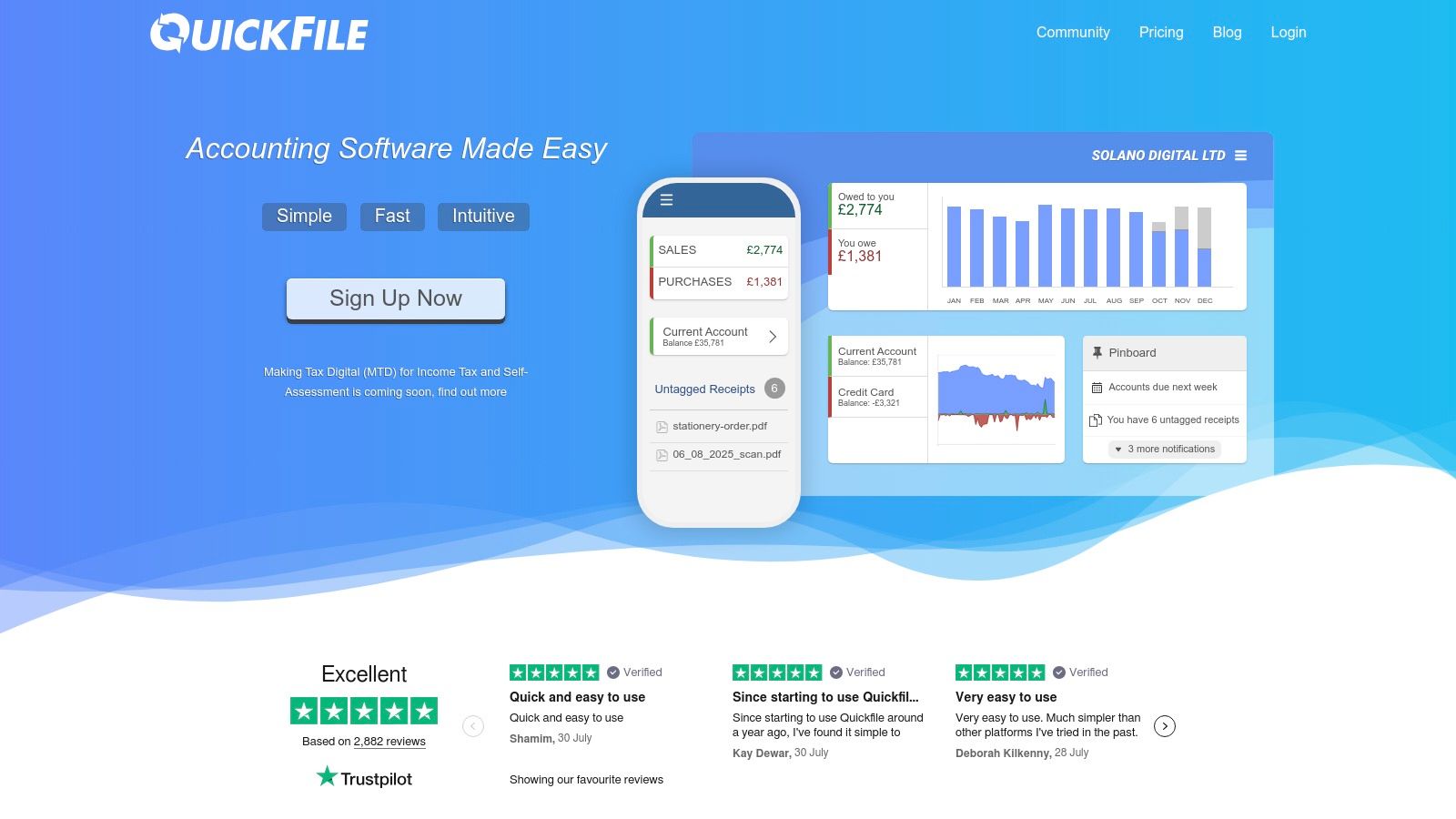
While platforms like Xero and QuickBooks focus on extensive integrations and scalability, QuickFile prioritises affordability and core UK compliance. It is fully MTD-compliant for VAT and provides robust tools for invoicing, expense tracking, and bank feeds. Its direct competitor in the UK-focused space, FreeAgent, is often bundled with bank accounts, whereas QuickFile offers its free tier with no strings attached, making it highly accessible for any UK-based startup.
Pros:
Cons:
QuickFile is the ideal choice for UK-based startups and freelancers seeking a cost-effective, compliant, and user-friendly accounting solution. It removes the initial financial barrier to professional bookkeeping, allowing founders to manage their finances effectively from day one without committing to a monthly subscription.
Navigating the landscape of the best cloud accounting software for startups can feel like a monumental task. We have explored a dozen powerful platforms, from industry titans like Xero and QuickBooks Online to specialised solutions like FreeAgent and niche players such as Clear Books. Each offers a unique combination of features, pricing structures, and integration capabilities designed to bring order to the financial chaos of a growing business.
The core takeaway is that there is no single "best" platform; there is only the best platform for your specific startup. A freelance contractor's needs are vastly different from those of an eCommerce business managing complex inventory, or a landlord overseeing a portfolio of Special Purpose Vehicles (SPVs). Your decision must be driven by your unique operational realities, your budget, and, crucially, your plans for future growth.
Choosing your software is a strategic decision, not just an administrative one. As you weigh your options, revisit these critical factors:
While the right software provides the data, it cannot provide wisdom. This is where the human element becomes indispensable. The most critical integration for any startup isn't an app; it's a proactive, tech-savvy accountant. They are the strategic partner who translates the raw numbers from your Xero dashboard or QuickBooks reports into actionable business intelligence.
An expert accountant does more than just ensure your compliance with HMRC and Companies House. They analyse your cash flow, identify opportunities for tax optimisation, structure your finances for investment, and provide the objective advice needed to navigate the inevitable challenges of growth. They are the difference between merely recording your financial history and actively shaping your financial future. When you pair the best cloud accounting software for startups with the right human expertise, you create a powerful synergy. The software handles the data with flawless efficiency, freeing up your accountant to focus on high-value strategic guidance that drives sustainable success. This combination is the true key to unlocking financial control and building a resilient, thriving enterprise.
Ready to combine the power of leading software with expert human oversight? At GenTax Accountants, we are certified experts in Xero, QuickBooks, and FreeAgent, using these tools to deliver real-time bookkeeping, strategic tax planning, and comprehensive accounting services tailored for UK startups and SMEs. Book a free consultation with GenTax Accountants today and let us build the perfect financial engine for your business.